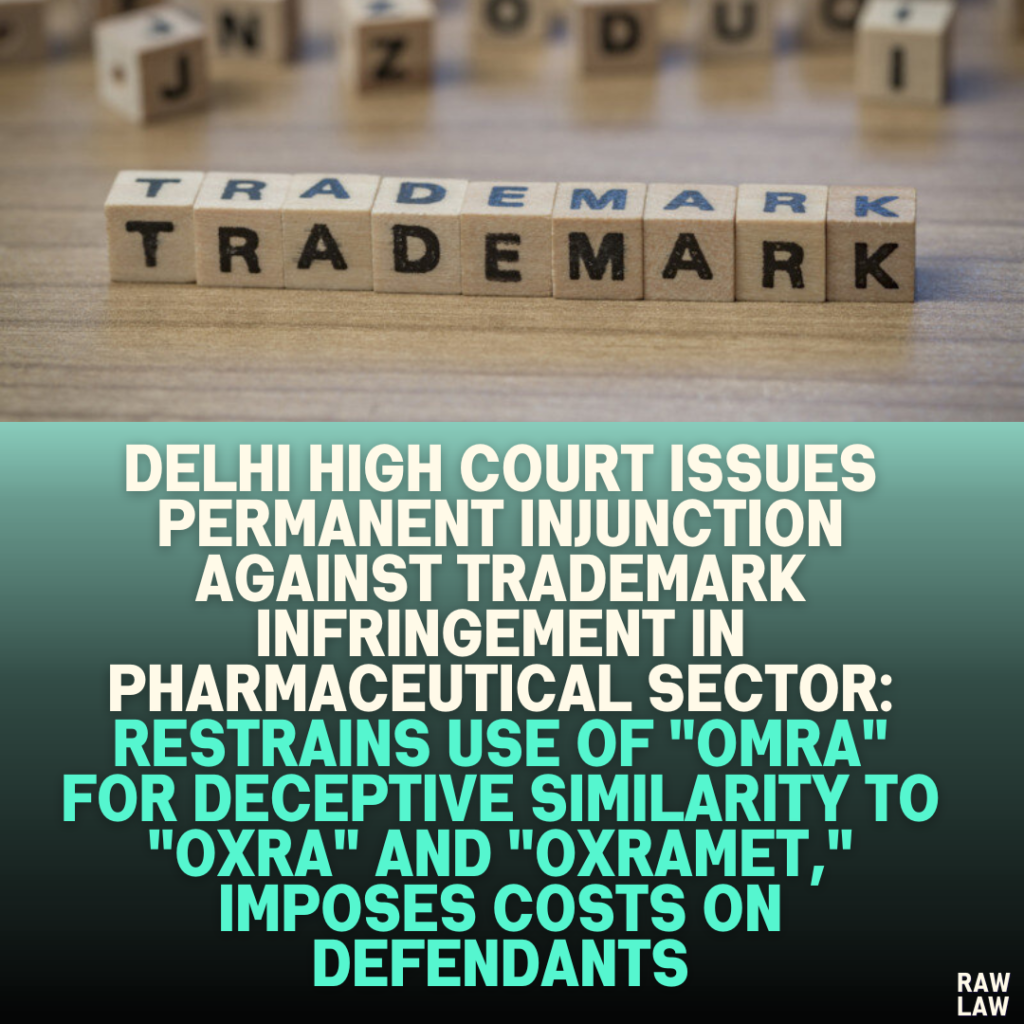1. Court’s Decision
The Delhi High Court issued a permanent injunction in favor of the plaintiff, Sun Pharma Laboratories Ltd., restraining the defendants from using the trademark “OMRA,” which was found to be deceptively similar to the plaintiff’s trademarks, “OXRA” and “OXRAMET.”
- The court directed the defendants to pay costs amounting to:
- ₹2,00,000 by Defendant No. 1.
- ₹1,50,000 by Defendant No. 2.
- ₹50,000 each by Defendants No. 3 and 4.
- The costs were to be paid within three months.
- The suit and all pending applications were disposed of.
2. Facts
- The plaintiff, a well-known pharmaceutical company, filed a suit for a permanent injunction against the defendants for allegedly infringing their registered trademarks, “OXRA” and “OXRAMET.”
- The defendants were engaged in manufacturing and marketing pharmaceutical products under the mark “OMRA,” which contained the same salt, Dapagliflozin, used to treat diabetes.
- The plaintiff contended that “OMRA” was phonetically and visually similar to their trademarks, leading to confusion among consumers and causing harm to their goodwill and reputation.
- On March 28, 2022, the court granted an ex parte ad interim injunction restraining the defendants from using the infringing mark and appointed local commissioners to seize infringing materials from the defendants’ premises.
3. Issues
The court identified the following primary legal issues:
- Does the use of the mark “OMRA” by the defendants infringe the plaintiff’s trademarks?
- Do the defendants’ actions constitute passing off and unfair competition?
- Should the court grant a summary judgment under Order XIII-A of the Commercial Courts Act, 2015?
4. Petitioner’s Arguments
- Trademark Infringement: The plaintiff argued that “OMRA” was deceptively similar to their trademarks “OXRA” and “OXRAMET” in appearance and pronunciation.
- Consumer Confusion: The plaintiff highlighted that both marks were used for diabetes medications in tablet form, which heightened the risk of confusion among consumers.
- Malafide Intent: The defendants knowingly adopted the infringing mark to unfairly benefit from the plaintiff’s established goodwill.
- Summary Judgment: The plaintiff contended that there were no contentious issues and sought summary disposal of the suit.
5. Respondent’s Arguments
- Admissions: Defendant No. 3 admitted to manufacturing the infringing products at the direction of Defendants No. 1 and 2 but claimed they ceased production after being notified of the litigation.
- Non-Participation: Defendants No. 1 and 4 neither filed written statements nor appeared during the proceedings, despite being served notices.
6. Analysis of the Law
- The court analyzed the provisions of the Trade Marks Act, 1999, particularly Sections 29 (Infringement of Registered Trade Marks) and 30 (Limitations on Effect of a Registered Trade Mark).
- Under Section 29, the court observed that “OMRA” was deceptively similar to the plaintiff’s registered marks, creating a likelihood of consumer confusion.
- The court also referred to Order XIII-A of the Commercial Courts Act, 2015, which allows summary disposal of cases where there is no real prospect of the defendant successfully defending the claims.
7. Precedent Analysis
While the judgment does not explicitly mention cited precedents, the court relied on established principles of trademark law:
- Likelihood of confusion as a standard test for infringement.
- Strict protection against imitation in the pharmaceutical industry due to potential health risks to consumers.
8. Court’s Reasoning
The court arrived at its decision based on the following observations:
- Similarity of Marks: The marks “OMRA” and “OXRA”/”OXRAMET” were found to be visually and phonetically similar.
- Consumer Confusion: The products catered to the same ailment (diabetes), used the same active ingredient (Dapagliflozin), and were sold in similar packaging, increasing the likelihood of confusion.
- Defendants’ Conduct:
- Defendant No. 2 had a valid drug license but collaborated with Defendant No. 1, which lacked a license.
- The defendants continued infringing activities despite the plaintiff’s registered trademarks and prior reputation.
- Defendants No. 1 and 4 failed to participate in the proceedings, further indicating a lack of defense.
- Admissions by Defendant No. 3: The manufacturer (Defendant No. 3) admitted to producing infringing products but claimed to have ceased operations after being informed of the lawsuit.
The court emphasized that the defendants’ conduct was neither bona fide nor honest, as evidenced by the seizure of infringing goods by local commissioners.
9. Conclusion
- The court issued a decree of permanent injunction restraining the defendants from using the mark “OMRA.”
- The defendants were ordered to pay costs, which were specified individually for each defendant.
- The judgment serves as a deterrent against trademark infringement, especially in critical sectors like pharmaceuticals.
10. Implications
- Consumer Protection: Ensures that consumers are not misled by deceptively similar marks in the pharmaceutical industry.
- Intellectual Property Enforcement: Reinforces the importance of protecting registered trademarks and penalizing willful infringement.
- Strict Scrutiny in Pharma Industry: Highlights the court’s strict stance against imitation in medicines, given the risks posed to public health.
